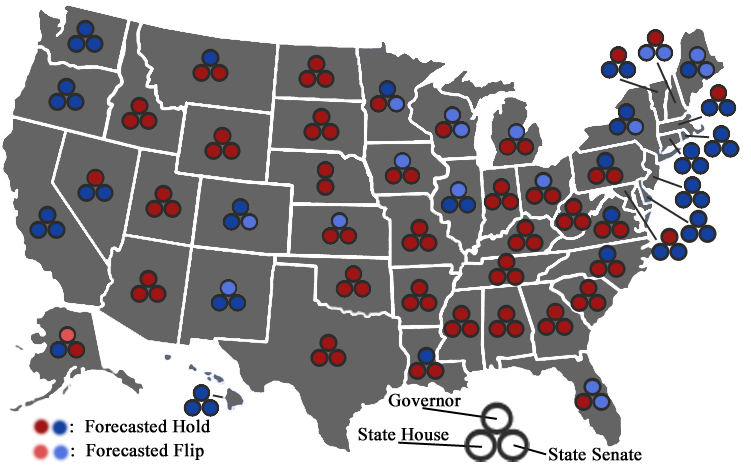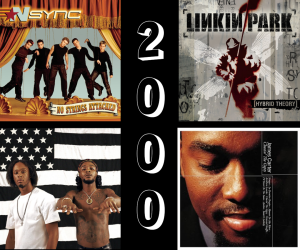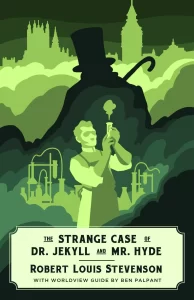Carter Hanson’s Official Election Predictions #4 – The State Legislatures
November 4, 2018
Hello and welcome back to Carter Hanson’s Official Election Predictions! Yesterday I ran down the House of Representatives forecast. This means I’ve covered most of the federal elections happening just 2 days from now. So today I’ve decided to get going on state and local races throughout the nation: the elections that nobody knows about but are just as—if not more—important than the Senate and House.
The State Legislatures

There are 7,383 state legislators in the United States today comprising 50 state houses and 49 state senates. Side note: Nebraska is the only state with a unicameral legislature (one house legislature) making it officially a pain in the neck for mapmakers and advocates for common sense alike.
Anyway, these state governments matter A LOT. When a party has a state trifecta (meaning that the governor’s mansion, state house, and state senate are controlled by a single party) they can basically do whatever they want. For Democrats this means passing sweeping gun control legislation like in New Jersey, or cracking down on climate change with harsher emissions standards like in California. Inversely, Republican state trifecta pass legislation such as anti-abortion bills like in Iowa, or massive tax cuts to the wealthy like in Kansas.
This legislation often has a much greater and more immediate impact on constituents than national jurisprudence passed in Washington. In addition to legislation, state governments are in charge of redistricting for a vast majority of US population. So when the next census rolls around in 2020, whoever controls the state legislatures will be tasked with redrawing not just the House of Representatives’ districts, but also their own—the state houses and state senates’—boundaries as well. In addition, because partisan gerrymandering is still perfectly legal and an accepted tradition in politics, whoever gets to draw the districts will essentially be able to control the nation for the next decade or more.
You might ask why do we still have such an anachronistic and archaic system deciding the fate of our country? Good question. Remember that when you vote.
Democrats currently have very little control over state governments in comparison to Republicans: 26 states have a Republican trifecta while Democrats only have a trifecta in 8. However, a lot of that might change this Midterm Election as Democratic enthusiasm is high and set to flip a fair amount of state legislatures and governors.
According to my forecast, Democrats will break somewhere around 7 Republican trifectas by taking control of one or two of the three state government branches: the state house, state senate, or the governor. In addition, Democrats look set to establish about 5 new trifectas themselves. This would put the control of state governments on a national scale at 19 Republican trifectas, 13 Democratic trifectas and 18 split state governments.
Those 7 Republican trifectas that will probably become split governments after election day are all either in the industrial and agricultural midwest or are swing states.
One of the most significant of these states is Florida, which looks like it will shift dramatically towards Democrats on Tuesday, flipping the governor’s mansion and the state senate. This comes after nearly two decades of Republican domination of both house of the state legislature and the governorship. However, Florida is looking suspiciously blue, a shakeup that could upend the GOP’s control and bring in a new era of politics. Also, the Democrats that are forecasted to be elected aren’t the traditional establishment or candidates that have been preferred by party strategists in previous elections. Instead they’re definitively progressive: the Democratic candidate for governor, Andrew Gillum, is by far the most likely winner of the race despite—or because of—the fact that he would be the first African-American governor of the state and is staunchly progressive.
American politics is changing. The midwest looks ready to shift back towards the Democrats after their surprise flip to Trump in 2016. Swing states like Florida and New Hampshire are likely leaving the bracket of states with Republican trifectas. Other swing states like Colorado and Maine are joining the throng of states with Democratic trifectas.
More importantly, the face of politics is changing. Women, minorities, and LGBT candidates are throwing their hat in the political ring in record numbers. So many milestones are being reached this election season. And this isn’t just a triumph for those groups that are being represented for the first time: it’s a victory for all of us Americans. It shows our changing perspective and our acceptance of the new world we’re a part of.
All of that starts with local and state government, where a staggering number of those political hopefuls meet their first tests. This is what is meant by “states are the laboratories of democracy”: they are the training ground, from the roots up, for who determines not just the future of their local communities and states, but the future of the nation as a whole.
Join me tomorrow for my final (although I’ll probably do a few more after the election) predictions on the ballot initiatives and amendments that are up for vote on Tuesday. Thanks for reading and I’ll see you tomorrow for Carter Hanson’s Official Election Predictions.















Carter Hanson • Nov 5, 2018 at 2:43 PM
Thanks for the comment!
What I meant with “It shows our changing perspective and our acceptance of the new world we’re a part of,” isn’t a focus on partisanship or growing divisiveness in the national environment, but more a unifying hope that the governors are reflecting the governed to an extent we’ve never seen before. When I say that I’m not talking about party preference or where politicians fall on the political spectrum, I’m talking about who they are and how that is increasingly representative of their constituencies.
Carter Hanson
David • Nov 4, 2018 at 6:11 PM
Carter,
This is a great piece!
I want to know more about this statement, “It shows our changing perspective and our acceptance of the new world we’re a part of.”
I hope that we are NOT accepting what we’ve seen emerging in the last years. I would think moving away from the bifurcation of political extremes to a centrist view would be more functional and a lot less violent. I have no problem with the centrist view moving left and right, but I want it to be representative of our society and not the average of extremes.
Am I missing your point in that statement?
Dave